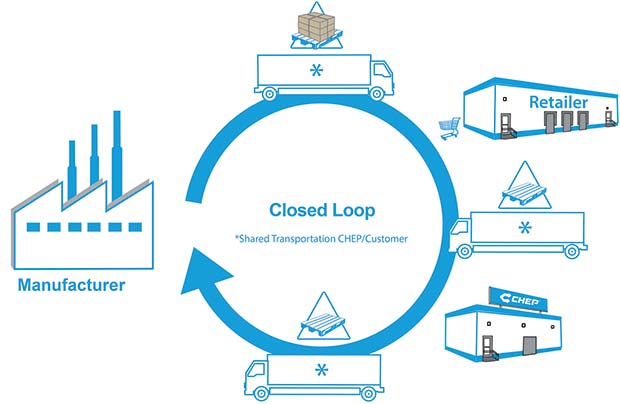CHEP announced that its Collaborative Transportation program removed 2.9 million kilometres of truck haulage from Europe’s roads in 2012, reducing carbon dioxide emissions by 2,340 metric tons – the equivalent of CO2 emissions from the electricity use of 350 homes for one year – while producing cost savings for CHEP customers.

Frédéric Fimbel, who leads the Collaborative Transportation program for CHEP Europe, said: “We are really starting to see the benefits of transport collaboration with our customers on pallet collections, deliveries and return flows. In 2012 we collaborated on this program with 50 companies across Europe, including major accounts such as leading Spanish dairy company CAPSA in Spain, water company San Pellegrino in Italy and retailer Carrefour in both Italy and France.”
In 2012, CHEP calculated that these collaborative initiatives saved an annualised 2.9 million kilometres across its supply chain, reducing the CO2 emissions by 2,340 metric tons.
Typically, a CHEP customer delivers products to a retailer on CHEP pallets, then returns with an empty truck. Under the Collaborative Transportation program, the truck – managed by a third-party logistics service provider – on completing such a delivery, collects empty pallets from a CHEP partner or delivers quality inspected pallets from the nearest CHEP plant for delivery elsewhere. This process eliminates empty truck movements and reduces transportation costs.
Juan José Freijo, Director of Sustainability for CHEPs global Pallets business, said: “Each initiative varies in terms of size and scale, but ultimately the goal of reducing transportation distances and empty kilometres across our network benefits CHEP, our customers and the environment.”
CHEP is expanding efforts to bring more customers into the Collaborative Transportation program at the same time as looking to identify other opportunities for initiatives that create supply-chain cost savings and sustainability benefits. Through this kind of collaboration, CHEP is helping customers reduce costs and benefitting the environment through lower carbon emissions. CHEP aims to be a strategic partner by becoming a leading green brand, providing the best environmental supply-chain solutions in the industry.
Carrefour Italy Transport Manager, Gasparini Matteo, says: “Since 2011, Carrefour has been looking for transport collaboration opportunities with our main suppliers. Using the same vehicle can guarantee the construction of a virtuous distribution network, setting up an efficient response to the transportation challenging situation in which we are all forced to operate. CHEP has proven to be a strategic partner for us.”

For further information regarding the CHEP’s Collaborative Transportation program please visit www.chep.com or contact Frédéric Fimbel, who leads the CHEP’s Collaborative Transportation program in Europe: Frederic.Fimbel@chep.com
CHEP




Comments are closed.